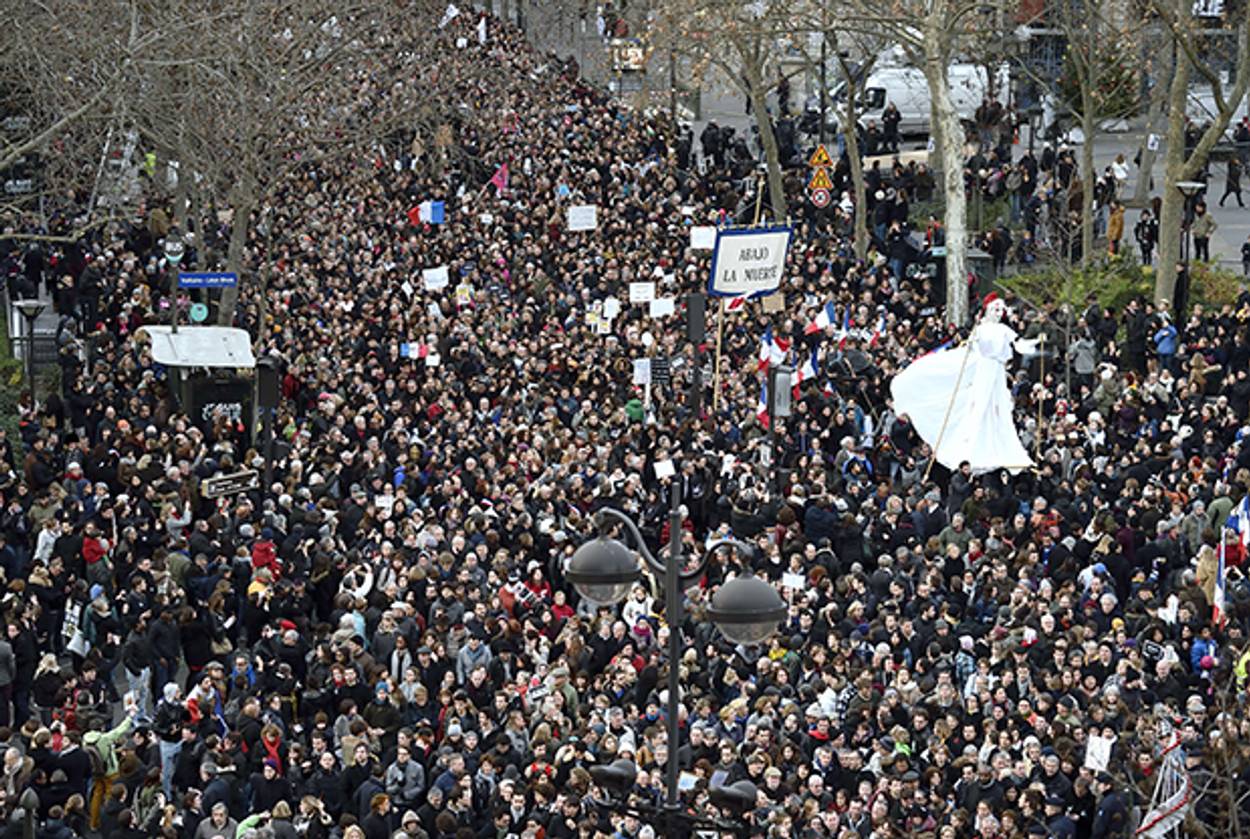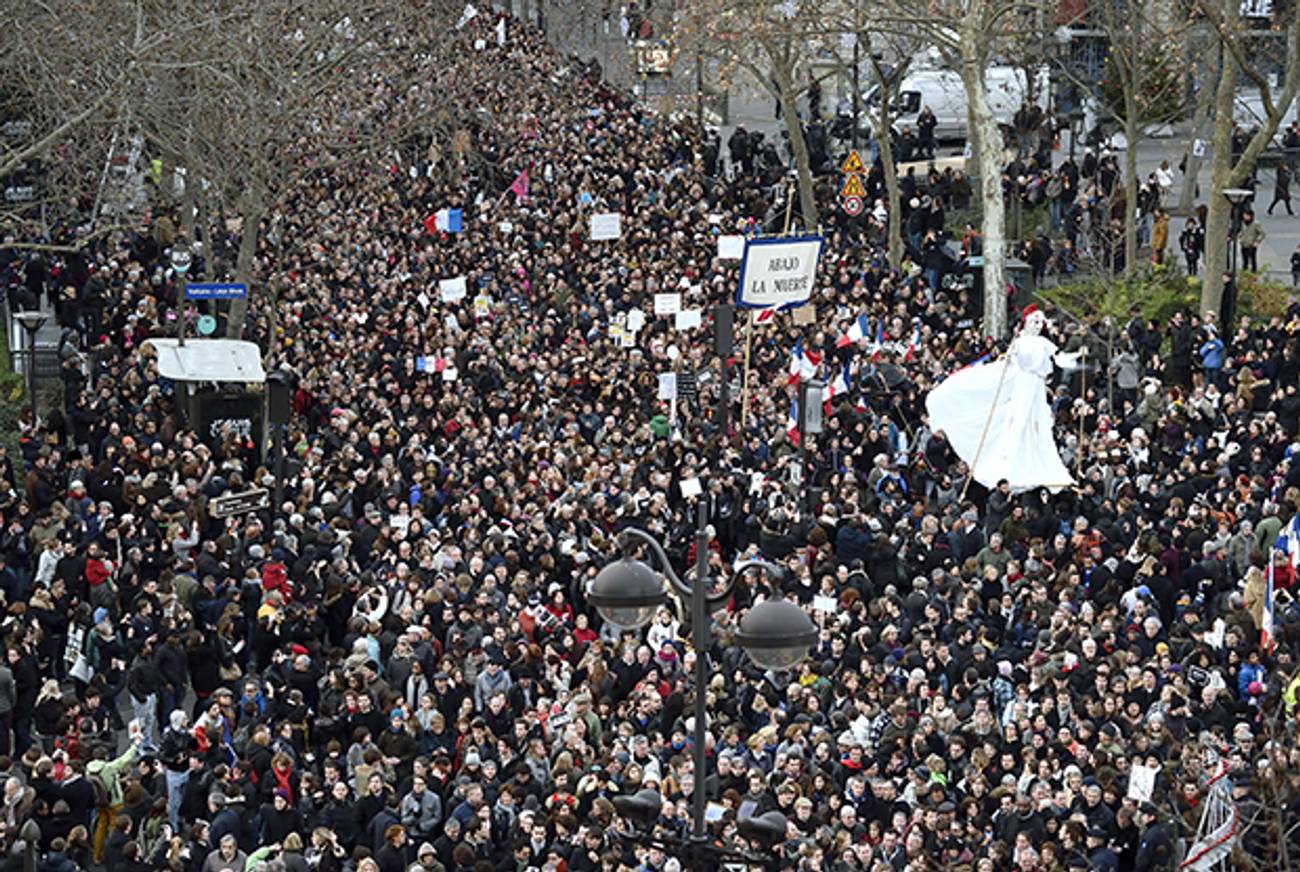Politics Loom Large at Paris Solidarity Rally
But for hundreds of thousands of Parisians, the march was about unity




Traumatized and disabused, France stumbled into dazed mourning for the victims of three days of bloody violence that had overtaken Paris. A day and a half after the siege of Paris had been lifted, and French special forces killed the jihadists who perpetrated the Charlie Hebdo massacre and the deadly siege on a kosher supermarket in Port Vincennes, the city’s residents united in a show of redemptive solidarity. Sunday’s national unity rally brought millions of French citizens into the streets to protest. If the rally organizer’s claims of between 1.5 and 2 million marchers in Paris and 3.7 million in total throughout France are correct, one out of every 18 Frenchmen participated.
The march was attended by dozens of foreign leaders and was certainly the largest such event in the history of the French state, rivaling the festivities that followed the Allied liberation of Paris in moral grandeur. Yet amidst the façade of national concord, the politics of attendance loomed large over the affair.
Ultra right-wing National Front party leader Marine Le Pen had intentionally not been invited by president François Hollande to attend the rally, despite having been invited to take part in a crisis meeting of French political leaders at the Élysée Palace. It was a feeble political move in that it both betrayed the ecumenical liberal spirit of the moment and strengthened Le Pen’s electoral hand. It also seemed particularly petty given that many of the foreign leaders linking their arms for the cameras were heads of state of countries that systematically persecute their journalists.
Israeli Prime Minister Benjamin Netanyahu, who flew in for the funerals of the French Jews slaughtered by the terrorists (four Jewish men killed at the kosher supermarket, and one Jewish woman killed in the raid on the Charlie Hebdo offices), was likewise an unwelcome guest at the march, which Hollande had reportedly asked him not to attend.
The city’s initial reactions to the Charlie Hebdo massacre were rooted in grassroots populism. Tens of thousands had gathered spontaneously at the Place de la République on Wednesday night after the attack and social media gave birth to the ubiquitous ‘Je Suis Charlie’ movement almost immediately. By the next day, black ‘Je Suis Charlie’ signs and posters had been plastered over what seemed to be every part of Paris. The journalist syndicates and advertisers put their own placard versions up behind the glass display cases of the newspaper kiosks. Ordinary people printed crude versions on their home printers. Gigantic black banners announcing ‘We are all Charlie’ were festooned over the length of the Hôtel de Ville. Prompting the distaste of many, especially in radical circles, the explosion of authentic populist grief was appropriated by the government almost immediately. The Sunday afternoon march and manifestation were declared a state sanctioned event by the government—the first time this had happened since the Mitterand era, television anchors lectured. Both a description and an injunction, ‘Ensemble’ was emblazoned in black-and-white on the cover of the day’s copy of Le Parisien.
The march itself was a dignified and orderly gesture of resilience, a triumphal credit to the sangfroid and inner resources of the French people. Imposing columns of protestors marched on République along its boulevards and arteries from every direction. Pencils and pens were tucked behind ears, homemade cartoon placards were held aloft and references to Charlie Brown abounded. It was a quietly principled expression of Republican values and tolerance; expressions of any sort of hatred were conspicuously absent from the proceedings. About 20 minutes before the appointed 3 p.m start time, a light drizzle began sprinkling the crowds like a pre-march purgation ritual.
Represented in the crowd were French citizens of every age, race, class, and political orientation. So many people thronged the square and its environs that the authorities had to block it off, and hundreds of thousands were wedged behind barricades, milling about for hours before being given the chance to begin marching. The din of the crowd was punctured by occasional waves of clapping and mournful renditions of La Marseillaise hummed by one section of marchers and picked up by the rest. The Morice brothers’ statue of Marianne at the demonstration’s epicenter was surrounded by Turkish, Ukrainian, Albanian, Tunisian, and Israeli flags. The element of old-school internationalism was so strong that I half-jokingly asked a French friend if we should start singing the Internationale. “No, might be divisive,” she warned me off.
Resolutely defiant, the crowd applauded the police as the Gendarme’s convoy of armored vans began driving away at the end of the rally. The march had brought a measure of catharsis to a grief-stricken and bloodied Paris, who, for the most part, had refrained from the brackish backlash and vigilante retaliations prophesied by the media commentariat. Sadly, though, not one of the millions of men and women marching in France yesterday could have had any illusions about this being the conclusion of the matter.
Previous: Paris’ March of Folly
Two Scenes From the Grand Synagogue of Paris
Related: A Tablet Exclusive Interview With Marine Le Pen, Head of the National Front
Vladislav Davidzon is Tablet’s European culture correspondent and a Ukrainian-American writer, translator, and critic. He is the Chief Editor of The Odessa Review and a Non-Resident Fellow at the Atlantic Council. He was born in Tashkent, Uzbekistan, and lives in Paris.